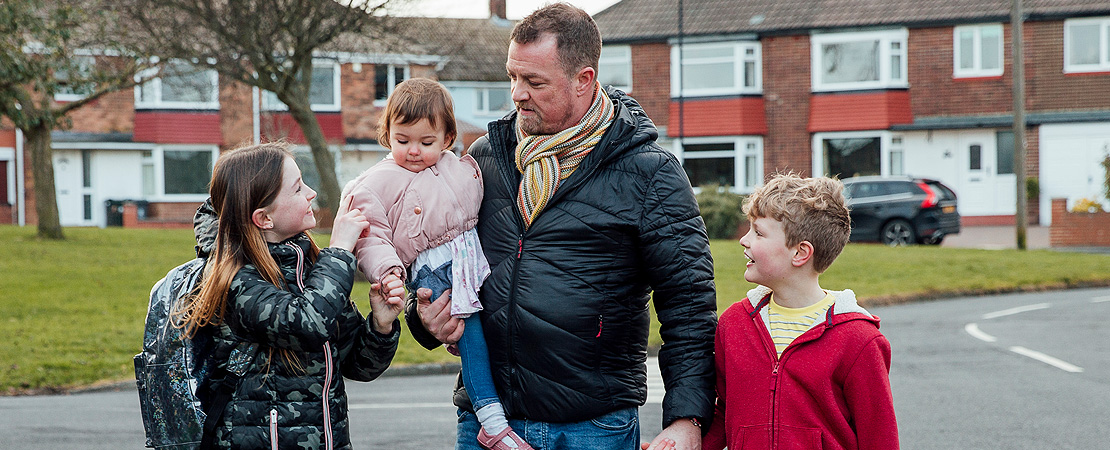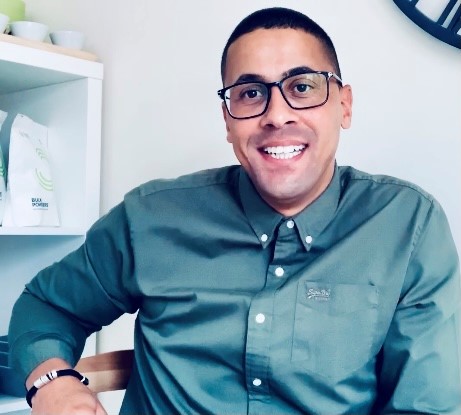James Jackson, our EDI and Wellbeing Programme Manager, shares his lived experience of dealing with mental health and mental illness. He discusses his coping mechanisms and insights into how role modelling can help create a ‘safe space’ to talk openly about mental health.
Thursday 3 February was Time to Talk Day, the nation's biggest conversation campaign which encourages everyone to take the time to connect and talk.
In the first of our series of Time to Talk blogs, James Jackson, EDI and Wellbeing Programme Manager, shares why it's important to create a 'safe space' to talk about mental health and explains his lived experience of dealing with mental health and mental illness.
I believe that creating a ‘safe space’ to talk about mental health and in particular poor mental health aids in dismantling the stigma. A stigma that is often the initial and very real barrier so many have to overcome, before seeking help. For me, it is important especially in the workplace and caring for my team and colleagues around me, that I role model being open and at times vulnerable to encourage others to speak up. I demonstrate that it is “Okay to not be Okay”. I feel that creating a safe space within organisations and for workforce colleagues, needs to be a committed wellbeing mission. This needs to be followed by signposting or engaging the appropriate professional support, together with, and often overlooked, pre-emptive provision and wellbeing strategies. I hope this blog helps someone/anyone feel less isolated or alone with their internal thoughts and feelings and encourages a discussion or ‘time to talk’. I hope some of the mechanisms I apply here inspire others to try and re-engage their version of these. I hope this blog helps colleagues and readers feel supported in their wellbeing and a greater sense of belonging.
My lived experience of mental health/illness and wellbeing:
I have witnessed my close friends and family have a range of experiences with their mental health - both good and bad - and have also supported many colleagues and team members over the years. I have had my struggles with mental health and mental illness. My relationship with mental health/illness and wellbeing has been a long one and started at a very young age. I did not realise this until well into my 20s and have since learnt that 17.4% of children aged 6-16 had a probable mental disorder in 2021. This recent study shows a rise in representation, up from 11.6% in 2017.
I continue to live with mental health and the risk of illness or impact of poor mental health as a result of childhood trauma, discrimination, and bereavement. I refer to my mental health as a journey like experiencing ‘peaks and valleys or high and lows’. I can look back over the years and say with relative accuracy I have experienced the ‘lows’ 1-2 times a year. These are typically triggered by an event or occasion in the annual calendar.
In more recent years and with the impact of COVID-19 lockdowns, isolation, and social restrictions…
I have struggled more, and in the past 2-3 years experienced the lows or ‘deep valleys’ 3 to 4 times a year. Most recently and in all honestly still affecting me today, I lost my mother who sadly died September 2021. As a result, I have been battling with bereavement and depression more intensely for the past 4 months. I have chosen #TimetoTalkDay to openly share and express my struggles and #rolemodel being vulnerable within a space and organisation like SCW, who I believe genuinely care and will support me, having witnessed and been involved in said support for workforce colleagues since joining in July 2021. I believe role modelling behaviour like this, in support of creating safe spaces to talk openly about mental health, is key towards building a culture of belonging at SCW.
What are my coping mechanisms?
I would always and initially state that research and learning about mental health/illness and wellbeing has been the number one support strategy for me. You cannot hope to combat and tackle the challenges that particularly poor mental health can throw at you if you do not understand the condition, signs, risks, and ways to seek/engage support and aid positive recovery. Alongside my journey of research and study I have also found the following to be helpful in a reactive and/or pre-emptive approach to manage my mental health and wellbeing:
- Going to the gym – cliché maybe but for me, I find a good workout, hour and half boxing, followed by a swim and steam room always lifts/maintains my positive feelings or mental resilience.
- Connect with nature – my mental health can at times manifest itself through OCD and in such a way that I need things to be neat, precise, or meticulous. Nature and being outside is an environment where I must accept no control or seek to identify symmetry, which allows my mind to fully relax and embrace the natural sounds and sights without distraction.
- Cooking – I love to cook and take my time to prepare a nice meal which I find therapeutic.
- Listen to music – need to be mindful here as music can often be a ‘mood shaper’. However the right and good music is great for me when I am feeling low (we can debate what ‘good music is’, I am sure :)).
- Time with friends and family – connecting with people that I care and love, and feeling that back is great for me.
- Helping others – supporting and helping others has always been a positive influence. However again be mindful of the support you extend and the drain this can have on you personally
- Work – enjoying work and delivering within work is a big positive driver for me. This comes with a warning though, as often, and I have experienced this personally and recently, we can drill our focus towards work for positive intentions and quickly become consumed, losing sight of ‘work-life balance’.
Related to work-life balance and the support available within SCW to manage this, I make use of the following:
- Protect and do something alternative within the ‘Survive and Thrive’ hour. Our Survive and Thrive hour is a dedicated hour in the working day, 1pm-2pm, that can be kept free of internal meetings and can be used to catch up with our colleagues, clear the inbox, or take a walk away from the desk. Survive and Thrive was introduced as a result of reflections from SCW staff and the realisation that since working from home, it can be easy to be booked into hours of back to back meetings and not get the headspace to do other things or to take a break.
- Engage in Coffee Roulette, a way to informally connect SCW colleagues (randomly paired), build a network, and boost staff wellbeing (for this I do very little preparation and just turn up for a chat).
- Schedule personal items like parental duties, private appointments, or wellbeing time and build my working day around these where necessary/possible.
- Seek professional support – I have in the past engaged in medical help and currently engage in talking therapy (although I am well overdue for a talking session).
Ultimately if anyone is feeling they need support, there are a multitude of resources to help, including Home - Mind.
If you would like to know more about the work SCW does in Mental Health - Mental health - NHS SCW Support and Transformation for Health and Care (scwcsu.nhs.uk)
If you have any questions, please contact James or one of the EDI and Wellbeing team -










